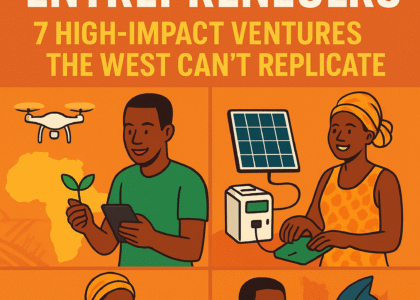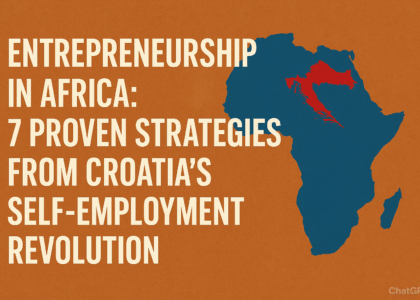Introduction: The Power of an Entrepreneurial Mindset in Leadership
Africa stands at a defining moment in history — rich in resources, youthful in population, and bursting with potential. Yet, unlocking this potential requires a shift in how leadership is understood and practiced. Imagine if every African leader thought and acted like Aliko Dangote, the billionaire entrepreneur who transformed cement, sugar, and other industries across Africa.
An entrepreneurial mindset in leadership means thinking innovatively, taking calculated risks, and relentlessly pursuing solutions that create value. It’s about transforming challenges into opportunities — a philosophy that has propelled Dangote and could propel Africa forward. If such a mindset guided governance, the continent could see exponential economic growth, job creation, and sustainable development.
Aliko Dangote: A Case Study in African Entrepreneurship Success
Aliko Dangote’s story is more than just a tale of personal success; it’s a roadmap for Africa’s economic independence. Through the Dangote Group, he has built Africa’s largest conglomerate, employing tens of thousands and impacting multiple industries — from cement and agriculture to oil refining and logistics.
What sets Dangote apart is his long-term vision and commitment to investing in Africa. Instead of focusing on short-term profits, he reinvests in local production, reducing the continent’s dependence on imports. His investment strategies highlight discipline, innovation, and belief in Africa’s potential — lessons every leader can emulate.
Imagine if presidents, governors, and ministers applied this same level of strategic entrepreneurship to public service: prioritizing infrastructure, productivity, and local industries over mere political gains.
The Impact of Investing in Local Businesses and Economies
For Africa to thrive, investment must begin at home. Dangote’s success demonstrates how local investments create ripple effects — stimulating economic activity, generating employment, and empowering communities.
When leaders champion local business development, they nurture ecosystems where small and medium enterprises (SMEs) flourish. These businesses, in turn, drive innovation and resilience within national economies.
By empowering communities through entrepreneurship, Africa can break cycles of dependency and poverty. A continent where leaders prioritize job creation, sustainable growth, and economic inclusivity will naturally progress toward self-reliance and prosperity.
Cultivating a Culture of Entrepreneurship Among African Leaders
Entrepreneurship is not confined to the private sector — it’s a mindset that can and should shape governance. Cultivating entrepreneurial leadership begins with education and mentorship.
African governments, universities, and organizations can create leadership training programs that emphasize innovation, strategic thinking, and results-oriented management. Public officials should learn how to identify opportunities, manage risks, and build sustainable ventures — just as successful entrepreneurs do.
Moreover, leaders who embody entrepreneurial values inspire their citizens. When young Africans see their leaders as innovators and problem-solvers, they too are motivated to create, invent, and lead. This ripple effect can redefine the entire continent’s culture toward innovation and productivity.
The Role of Government Policies in Supporting Entrepreneurial Growth
Even the most brilliant entrepreneurs cannot thrive in an environment stifled by red tape and uncertainty. That’s why government policy plays a crucial role in shaping entrepreneurial success.
To build an economy that mirrors Dangote’s vision, governments must:
Simplify regulatory processes to make it easier to start and scale businesses.
Offer tax incentives and grants that encourage innovation and investment.
Invest heavily in infrastructure development, including power, transport, and digital connectivity.
Create sustainable policies that protect investors while ensuring equitable growth.
A well-designed policy environment does more than attract foreign capital — it empowers local entrepreneurs to lead Africa’s transformation from within.
A Collaborative Effort: Public and Private Sectors Working Together
For Africa to reach its full potential, collaboration between the public and private sectors is essential. When governments partner with businesses, they can pool resources, share expertise, and scale impact.
Public-Private Partnerships (PPPs) can drive large-scale development in energy, manufacturing, healthcare, and technology. Investment forums and entrepreneurship conferences can connect visionary leaders with investors, fostering innovation and cross-border trade.
By encouraging collaboration instead of competition between sectors, Africa can build sustainable economies driven by innovation and shared prosperity.
Conclusion: Envisioning a Bright Future for Africa Through Entrepreneurial Leadership
If every African leader embraced an entrepreneurial mindset like Aliko Dangote, the continent would be unstoppable. Africa would no longer rely on foreign aid or external validation — it would become a hub of innovation, productivity, and prosperity.
But this vision requires action: investing in people, reforming policies, fostering creativity, and leading with purpose. It’s time for Africa’s leaders to think like entrepreneurs — not just managing resources but multiplying them.
The future is waiting. Let’s take action and build an Africa led by visionaries, innovators, and change-makers.
Frequently Asked Questions (FAQ)
- What is an entrepreneurial mindset in leadership?
An entrepreneurial mindset in leadership refers to thinking creatively, embracing innovation, and taking calculated risks to solve problems and create value. It focuses on finding opportunities in challenges — a key trait seen in leaders like Aliko Dangote.
- Why is Aliko Dangote considered a role model for African leadership?
Aliko Dangote is Africa’s richest man and a prime example of what visionary entrepreneurship can achieve. His focus on local production, long-term investment, and commitment to Africa’s development make him a model for leaders aiming to drive economic growth.
- How can African governments promote entrepreneurship?
Governments can promote entrepreneurship by improving the regulatory environment, offering tax incentives, funding startup incubators, and building infrastructure that supports business growth. Policies that encourage innovation and public-private collaboration are essential.
- What role does education play in developing entrepreneurial leaders?
Education plays a foundational role. Leadership and entrepreneurship training programs equip leaders with skills in innovation, strategic thinking, and risk management — preparing them to transform their communities through effective decision-making.
- How can the private and public sectors work together for economic growth?
By forming public-private partnerships (PPPs), both sectors can combine resources to tackle challenges like infrastructure, energy, and employment. Such collaborations foster innovation and accelerate sustainable economic development across Africa.
- What would Africa look like if every leader had an entrepreneurial mindset?
If every African leader adopted an entrepreneurial mindset, the continent would experience massive industrial growth, innovation, and job creation. Dependence on foreign aid would diminish, replaced by self-sustaining economies driven by creativity and productivity.





